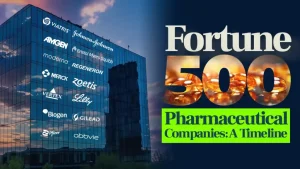
By relying heavily on groundbreaking research and innovation, the pharmaceutical industry is at the helm of affairs in developing medicines essential for the well-being of humankind. With a repertoire of offerings that include Penicillin, Insulin, vaccines, and more, pharmaceutical companies have changed the contour of global healthcare. Medicines manufactured by pharmaceutical companies are impactful discoveries that cure diseases that were once fathomed incurable and profoundly impact the life expectancy of the global population.
The COVID-19 pandemic, an increased incidence of chronic metabolic disorders, cancer, and a growing geriatric population with a high burden of disease are acting as triggers of organic and inorganic growth in the pharmaceutical industry. The pharmaceutical industry’s revenue, valued at USD 222.4 billion is poised to reach USD 352.98 billion by 2031, growing at a CAGR of 5.9%.
A timeline of pharmaceutical industry: The past and the present
The earliest roots of the pharmaceutical industry trace back to the Middle Ages when the apothecaries offered trial-and-error treatments based on the existing centuries-old folk know-how. However, today’s concept of modern pharmaceutical companies was coined during the 17th century’s Scientific Revolution. The 18th-century era that saw the amalgamation of the Scientific Revolution and Industrial Revolution laid the foundation for the modern-day architecture of the pharmaceutical sector.
One of the earliest enterprises to embrace this amalgamation was a company in Germany, Merck. Though it started as a pharmacy in 1827, Heinrich Emanuel Merck took an industrial and scientific path by manufacturing alkaloids.
Similarly, one more pharmaceutical stalwart, Pfizer, started producing patented medicines in 1842, and by 1849, it was the world’s first factory exclusively manufacturing medicine like anti-parasitic drugs. Pfizer’s business expanded rapidly, with demand for painkillers and antiseptics skyrocketing during the American Civil War. Further, in 1876, a multi-talented American industrialist, Eli Lilly, set up a pharmaceutical business, steering the industry’s focus towards R&D besides manufacturing. It discovered quinine to treat Malaria. In 1899, the German drug firm Bayer synthesized Aspirin and marketed it across the globe.
The modern pharmaceutical industry was formed during the interwar era of 1918 to 1939. This era witnessed some major breakthroughs, including Eli Lilly collaborating with scientists to purify the isolated Insulin extracts for mass production. After the discovery of Penicillin’s antibiotic properties in 1928, Merck, Pfizer, and Squibb mass-produced the antibiotic to save the lives of millions of soldiers during World War II.
The post-war era marked pharmaceutical giants, like Merck, Eli Lilly, and Pfizer, creating ripples in the global market with a list of novel drugs, including oncology medicines, inhibitors improving cardiac health, ubiquitous medications like paracetamol, anti-depressants, oral contraceptives and more. Further, from 2000 onwards, the pharma companies tapped into the potential of gene therapies and immunotherapy. Owing to the COVID-19 outbreak, all the major pharma companies focused on vaccine production to fight the looming threat of the pandemic.
Fortune 500 Pharmaceutical Companies: The pharmaceutical behemoths that made it to the coveted list
1. Pfizer
Pfizer is a biopharmaceutical company established in 1849 by German entrepreneurs Charles Pfizer and Charles Earhart. Based out of New York, Pfizer is known for products like Advil, Zoloft, and Xanax. It specializes in manufacturing more than 350 pharmaceuticals, including COVID-19 vaccines and medicines for heart ailments, diabetes, and endocrine and neurological disorders. Pfizer’s COVID-19 vaccine, Comirnaty, and Anticoagulant, Eliquis, are becoming blockbuster products in the market; it secured 38th rank in the Fortune 500 list. Pfizer’s success relies immensely on its ability to apply science and resources to make treatments and therapies profoundly impact the lives of the global population.
2. Johnson & Johnson
James Wood Johnson and Edward Mead Johnson started J&J in Brunswick in 1886 as a company producing ready-to-use sterile surgical dressings. Though J&J had humble beginnings, owing to its innovative products, this biotechnology, pharmaceutical, and medical technology-based multinational American company ranks 40th on the Fortune 500 list. Besides developing prescription medicines and medical devices, some of J&J’s iconic consumer products include Band-Aids, Tylenol, Johnson’s Baby Powder, hip and spine implants. J&J’s top revenue-generating medicines include Darzalex for treating myeloma. With a well-equipped R&D, massive investment capabilities, and adherence to sound scientific methods, J&J continues its run of creating top-notch pharmaceuticals.
3. Merck
Merck is an American multinational pharmaceutical company based out of Rahway, New Jersey. It is the frontrunner in producing medicines, vaccines, biological therapies, and animal health products, securing the 71st position on the Fortune 500 list. Merck gained a competitive advantage over several new market entrants owing to its research capabilities and immense experience in discovering new drugs. In recent years, Merck achieved remarkable revenue targets due to its blockbuster drugs, which include the iconic humanized antibody for cancer immunotherapy, Keytruda, anti-diabetic medication, Gardasil, and vaccines including Varivax and Pneumovax.
4. AbbVie
Abbott Laboratories’ research-based pharmaceutical manufacturing spin-off AbbVie was established in 2012. Based out of Illinois, AbbVie’s success is attributed to its ability to bring products to the market that thrive on innovation and commercial scaling of processes to benefit users and healthcare providers alike. Owing to its groundbreaking products that increased its revenue margins, including the medication Humira to treat rheumatoid arthritis and Crohn’s disease, Celexa, an anti-depressant drug, and more, AbbVie has secured a 73rd position in the Fortune 500 list.
5. Bristol-Myers Squibb
Bristol-Myers Squibb is an American pharmaceutical company established in 1887 in Princeton, New Jersey. Formulating a strategy that utilizes the resources of a pharma company, combined with the entrepreneurial spirit of a biotech firm, Bristol-Myers Squibb is creating prescription therapeutics for cancer, HIV/AIDS, cardiovascular disorders, psychological disorders, and fibrosis. Securing the 95th spot in the Fortune 500 list, Bristol-Myers Squibb’s top-selling offerings include the antipsychotic Abilify, blood thinner Plavix, and an anti-cancer drug Opdivo.
6. Eli Lilly
Established in 1867, Eli Lilly is an American pharmaceutical company based in Indianapolis, Indiana. Some of Eli Lilly’s earliest achievements include the mass production of the Polio vaccine, Insulin, recombinant human Insulin, the introduction of gelatin coating pills and capsules, and the consumption of flavored and sugar-coated pills. By investing a significant portion of its revenue in R&D, Eli Lily has created an impactful portfolio of medicines for treating the ailments of bone muscle joint, endocrine disorders, and neurodegenerative disorders, securing the 142nd position in the Fortune 500 list. Some of Eli Lilly’s top revenue-generating products include anti-diabetic medications Trulicity and Mounjaro.
7. Gilead Sciences
Established in 1987 by Michael L. Riordan, Gilead Sciences is an American biopharmaceutical company based in Foster City, California. Gilead Sciences is at the forefront of the world’s greatest health challenges by delivering a cure for Hepatitis C and preventing the transformation of HIV with its pharmaceutical offerings. By acquiring patent protection on many of its innovative line of products, Gilead Sciences wields a pricing power and outsmarts many of its competitors. With scientific innovation, Gilead is addressing the unmet medical needs of the global population and fortifying its profitability. A testament to this is Gilead securing the 150th position in the Fortune 500 list. Gilead’s blockbuster medications capturing the market in recent times include antiviral drugs, Biktarvy for HIV treatment, and Veklury for COVID-19 treatment.
8. Amgen
AMGen an American biopharmaceutical company, is the brainchild of William. K. Bowes and associates. Established in Thousand Oaks, California, on April 8, AMGen’s primary focus involves six therapeutic areas comprising cardiovascular diseases, oncology, bone health, nephrology, and inflammation. AMGen’s existing and developing product lines, as well as long-lasting patents, have helped it gain a strong foothold in the global markets. A front runner, transforming science and biotechnology into impactful therapies that save lives, AMGen’s groundbreaking innovations include medicines created through complex processes involving living cells. AMGen’s top-revenue generating medicines, Prolia and Xgeva, monoclonal antibodies for treating osteoporosis, captivating the markets; it has secured the 154th spot in the Fortune 500 list.
9. Moderna
Moderna is an American biotechnology pharmaceutical company based out of Cambridge, Massachusetts. It was established in 2010 by Derrick Rossi, Timothy A. Springer, Kenneth R. Chien, Robert S. Langer, and Noubar Afeyan. Moderna became omnipresent in the news during the COVID-19 pandemic owing to its determined early efforts to develop a vaccine against the new strain of coronavirus. Moderna is a pioneer in mRNA technology, focusing on RNA therapeutics with the possibility of creating anti-cancer vaccines and vaccines against viruses like Nipah, Zika, HIV, and more. With its top-revenue generating Spikevax, an mRNA vaccine against COVID-19, Moderna secured the 211th position in the Fortune 500 list.
10. Viatris
The merger of Mylan and Pfizer’s legacy division, Upjohn, led to the establishment of Viatris, an American pharmaceutical and healthcare corporation, in 2020. Based out of Canonsburg, Pennsylvania, Viatris has a solid product portfolio of crucial therapeutics that span non-communicable infectious diseases, biosimilars, and several over-the-counter medicines. With top revenue-generating medicines like Lipitor, a statin to treat cardiovascular disease, and Norvasc, a prescription medicine for treating hypertension, Viatris secured a 256th spot in the Fortune 500 list.
12. Regeneron Pharmaceuticals
Regeneron Pharmaceuticals is an American Biotechnology Company based in Tarrytown, New York. It was established by Leonard Schleifer and George Yancopoulos in 1988. Regenron’s primary focus includes exploring neurotrophic factors’ regenerative capabilities and creating medicines to induce the formation of blood vessels. Regeneron is a world-class Biotechnology Company committed to developing innovative drugs commercialized and manufactured to the highest standards. Owing to blockbuster products like Regen-COV, a monoclonal antibody medicine to treat COVID-19, and Libtayo, a monoclonal antibody to treat skin cancer, captivating the market, Regeneron secured a 339th spot in the Fortune 500 list.
12. Biogen
Biogen is a Biotechnology company based out of Cambridge, Massachusetts. Established by Kenneth Murray, Phillip Allen Sharp, Walter Gilbert, Heinz Schaller, and Charles Weissmann in the year 1978, Biogen is a frontrunner in the discovery and development of medicines for treating neurological diseases like multiple sclerosis, Spinal muscular atrophy, neuromuscular disease, and treatments addressing the pathology of Alzheimer’s disease. Biogen’s top revenue-generating medicines, which made it secure 386th position in the Fortune 500 list, include Tysabri, a humanized monoclonal antibody to treat multiple sclerosis and Crohn’s disease, and Spinraza, a prescription drug to treat muscular atrophy.
13. Vertex Pharmaceuticals
Vertex Pharmaceuticals is an American biopharmaceutical company established by Joshua Boger and Kevin Kinsella in 1989. Based out of Boston, Massachusetts, Vertex’s product pipeline focuses on medicines to treat viral infections, cancer, and inflammatory and immune disorders. A pioneer embracing the explicit strategy of rational drug design, Vertex’s strategy centers around creating transformative medicines to mitigate risks and treat serious ailments in specialty markets with massive unmet needs. With top revenue-generating medicines like Trikafta, a combination medication to treat cystic fibrosis, making a mark in the market, Vertex secured 427th position in the Fortune 500 list.
14. Zoetis
Zoetis is an American pharmaceutical company, the world’s largest producer of vaccines and medicines for pets and livestock. Initially, Pfizer’s animal health subsidiary, Zoetis, was established as an independent entity after Pfizer’s spin-off in 2012. With massive investment in R&D, unrivaled operations, and distribution capacity scaling, Zoetis has cemented itself as the world leader in animal healthcare. Owing to high sales in the animal parasiticides and vaccines segment, Zoetis ramped up its revenue margins, securing the 463rd position in the Fortune 500 list.
Wrapping Up
Pharmaceutical companies have made significant inroads with immense research and achievements in some healthcare segments, including managing conditions like Diabetes, hypertension, and immune disorders. However, mitigating the risk associated with antimicrobial resistance remains challenging for the pharmaceutical giants. Disruptive technologies, like generative AI, blockchain, and immersive technologies, are empowering pharma behemoths to continue their crusade against protecting millions of lives from dreadful diseases. The ongoing shift toward precision medicine, owing to the extensive use of cell therapies and gene therapies, utilization of AI in drug designing, and automation of manufacturing processes, are enabling the pharmaceutical industry to deliver the best to humankind.

